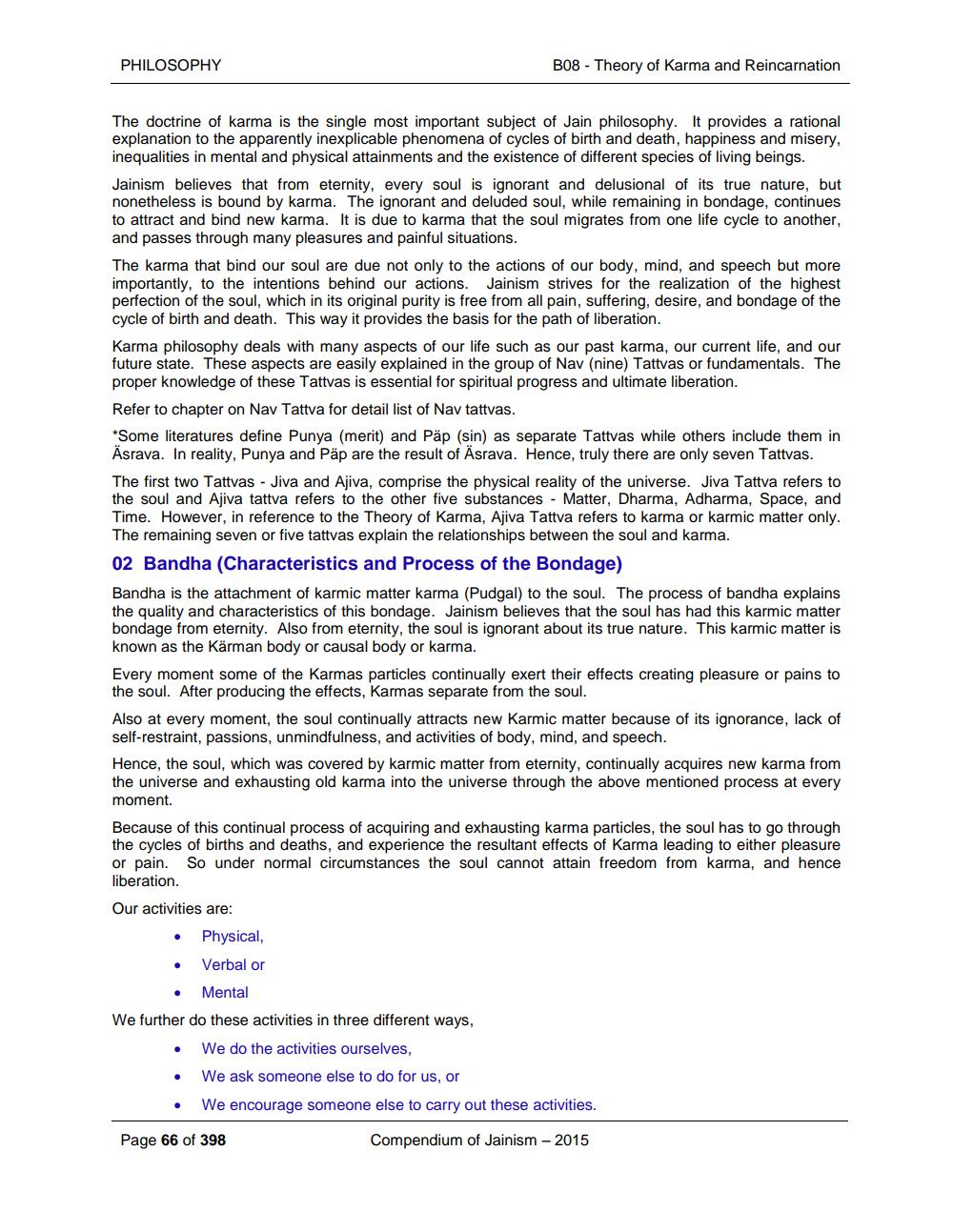________________
PHILOSOPHY
B08 - Theory of Karma and Reincarnation
The doctrine of karma is the single most important subject of Jain philosophy. It provides a rational explanation to the apparently inexplicable phenomena of cycles of birth and death, happiness and misery, inequalities in mental and physical attainments and the existence of different species of living beings. Jainism believes that from eternity, every soul is ignorant and delusional of its true nature, but nonetheless is bound by karma. The ignorant and deluded soul, while remaining in bondage, continues to attract and bind new karma. It is due to karma that the soul migrates from one life cycle to another, and passes through many pleasures and painful situations. The karma that bind our soul are due not only to the actions of our body, mind, and speech but more importantly, to the intentions behind our actions. Jainism strives for the realization of the highest perfection of the soul, which in its original purity is free from all pain, suffering, desire, and bondage of the cycle of birth and death. This way it provides the basis for the path of liberation. Karma philosophy deals with many aspects of our life such as our past karma, our current life, and our future state. These aspects are easily explained in the group of Nav (nine) Tattvas or fundamentals. The proper knowledge of these Tattvas is essential for spiritual progress and ultimate liberation. Refer to chapter on Nav Tattva for detail list of Nav tattvas. *Some literatures define Punya (merit) and Päp (sin) as separate Tattvas while others include them in Asrava. In reality, Punya and Päp are the result of Asrava. Hence, truly there are only seven Tattvas. The first two Tattvas - Jiva and Ajiva, comprise the physical reality of the universe. Jiva Tattva refers to the soul and Ajiva tattva refers to the other five substances - Matter, Dharma, Adharma, Space, and Time. However, in reference to the Theory of Karma, Ajiva Tattva refers to karma or karmic matter only. The remaining seven or five tattvas explain the relationships between the soul and karma. 02 Bandha (Characteristics and Process of the Bondage) Bandha is the attachment of karmic matter karma (Pudgal) to the soul. The process of bandha explains the quality and characteristics of this bondage. Jainism believes that the soul has had this karmic matter bondage from eternity. Also from eternity, the soul is ignorant about its true nature. This karmic matter is known as the Kärman body or causal body or karma. Every moment some of the Karmas particles continually exert their effects creating pleasure or pains to the soul. After producing the effects, Karmas separate from the soul. Also at every moment, the soul continually attracts new karmic matter because of its ignorance, lack of self-restraint, passions, unmindfulness, and activities of body, mind, and speech. Hence, the soul, which was covered by karmic matter from eternity, continually acquires new karma from the universe and exhausting old karma into the universe through the above mentioned process at every moment. Because of this continual process of acquiring and exhausting karma particles, the soul has to go through the cycles of births and deaths, and experience the resultant effects of Karma leading to either pleasure or pain. So under normal circumstances the soul cannot attain freedom from karma, and hence liberation. Our activities are:
Physical, • Verbal or
Mental We further do these activities in three different ways,
• We do the activities ourselves, • We ask someone else to do for us, or • We encourage someone else to carry out these activities.
Page 66 of 398
Compendium of Jainism - 2015




